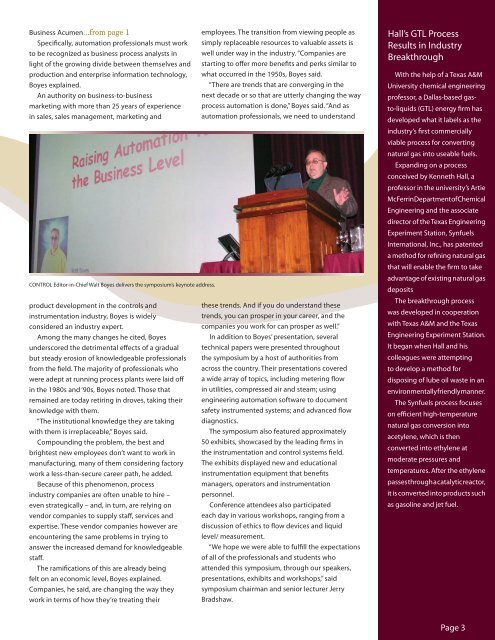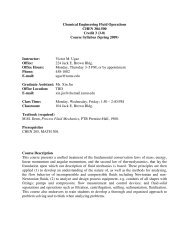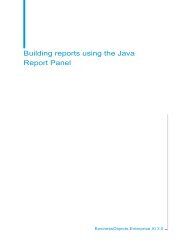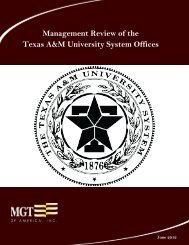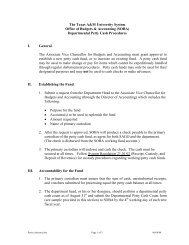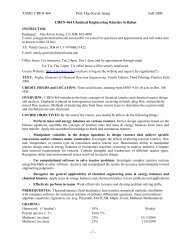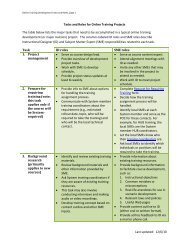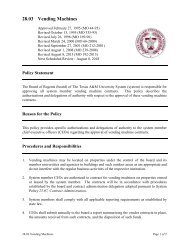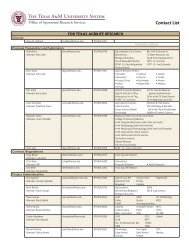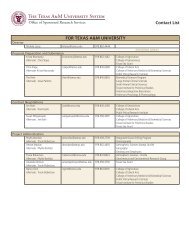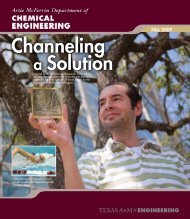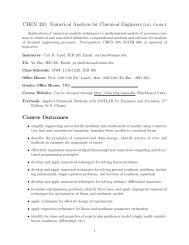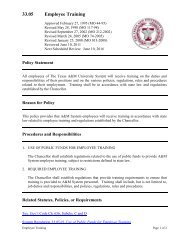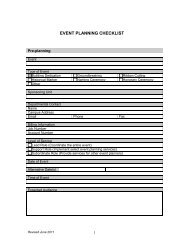SECURITY - Department of Chemical Engineering - Texas A&M ...
SECURITY - Department of Chemical Engineering - Texas A&M ...
SECURITY - Department of Chemical Engineering - Texas A&M ...
Create successful ePaper yourself
Turn your PDF publications into a flip-book with our unique Google optimized e-Paper software.
Business Acumen...from page 1Specifically, automation pr<strong>of</strong>essionals must workto be recognized as business process analysts inlight <strong>of</strong> the growing divide between themselves andproduction and enterprise information technology,Boyes explained.An authority on business-to-businessmarketing with more than 25 years <strong>of</strong> experiencein sales, sales management, marketing andCONTROL Editor-in-Chief Walt Boyes delivers the symposium’s keynote address.product development in the controls andinstrumentation industry, Boyes is widelyconsidered an industry expert.Among the many changes he cited, Boyesunderscored the detrimental effects <strong>of</strong> a gradualbut steady erosion <strong>of</strong> knowledgeable pr<strong>of</strong>essionalsfrom the field. The majority <strong>of</strong> pr<strong>of</strong>essionals whowere adept at running process plants were laid <strong>of</strong>fin the 1980s and ‘90s, Boyes noted. Those thatremained are today retiring in droves, taking theirknowledge with them.“The institutional knowledge they are takingwith them is irreplaceable,” Boyes said.Compounding the problem, the best andbrightest new employees don’t want to work inmanufacturing, many <strong>of</strong> them considering factorywork a less-than-secure career path, he added.Because <strong>of</strong> this phenomenon, processindustry companies are <strong>of</strong>ten unable to hire –even strategically – and, in turn, are relying onvendor companies to supply staff, services andexpertise. These vendor companies however areencountering the same problems in trying toanswer the increased demand for knowledgeablestaff.The ramifications <strong>of</strong> this are already beingfelt on an economic level, Boyes explained.Companies, he said, are changing the way theywork in terms <strong>of</strong> how they’re treating theiremployees. The transition from viewing people assimply replaceable resources to valuable assets iswell under way in the industry. “Companies arestarting to <strong>of</strong>fer more benefits and perks similar towhat occurred in the 1950s, Boyes said.“There are trends that are converging in thenext decade or so that are utterly changing the wayprocess automation is done,” Boyes said. “And asautomation pr<strong>of</strong>essionals, we need to understandthese trends. And if you do understand thesetrends, you can prosper in your career, and thecompanies you work for can prosper as well.”In addition to Boyes’ presentation, severaltechnical papers were presented throughoutthe symposium by a host <strong>of</strong> authorities fromacross the country. Their presentations covereda wide array <strong>of</strong> topics, including metering flowin utilities, compressed air and steam; usingengineering automation s<strong>of</strong>tware to documentsafety instrumented systems; and advanced flowdiagnostics.The symposium also featured approximately50 exhibits, showcased by the leading firms inthe instrumentation and control systems field.The exhibits displayed new and educationalinstrumentation equipment that benefitsmanagers, operators and instrumentationpersonnel.Conference attendees also participatedeach day in various workshops, ranging from adiscussion <strong>of</strong> ethics to flow devices and liquidlevel/ measurement.“We hope we were able to fulfill the expectations<strong>of</strong> all <strong>of</strong> the pr<strong>of</strong>essionals and students whoattended this symposium, through our speakers,presentations, exhibits and workshops,” saidsymposium chairman and senior lecturer JerryBradshaw.Hall’s GTL ProcessResults in IndustryBreakthroughWith the help <strong>of</strong> a <strong>Texas</strong> A&MUniversity chemical engineeringpr<strong>of</strong>essor, a Dallas-based gasto-liquids(GTL) energy firm hasdeveloped what it labels as theindustry’s first commerciallyviable process for convertingnatural gas into useable fuels.Expanding on a processconceived by Kenneth Hall, apr<strong>of</strong>essor in the university’s ArtieMcFerrin <strong>Department</strong> <strong>of</strong> <strong>Chemical</strong><strong>Engineering</strong> and the associatedirector <strong>of</strong> the <strong>Texas</strong> <strong>Engineering</strong>Experiment Station, SynfuelsInternational, Inc., has patenteda method for refining natural gasthat will enable the firm to takeadvantage <strong>of</strong> existing natural gasdepositsThe breakthrough processwas developed in cooperationwith <strong>Texas</strong> A&M and the <strong>Texas</strong><strong>Engineering</strong> Experiment Station.It began when Hall and hiscolleagues were attemptingto develop a method fordisposing <strong>of</strong> lube oil waste in anenvironmentally friendly manner.The Synfuels process focuseson efficient high-temperaturenatural gas conversion intoacetylene, which is thenconverted into ethylene atmoderate pressures andtemperatures. After the ethylenepasses through a catalytic reactor,it is converted into products suchas gasoline and jet fuel.Page 3


